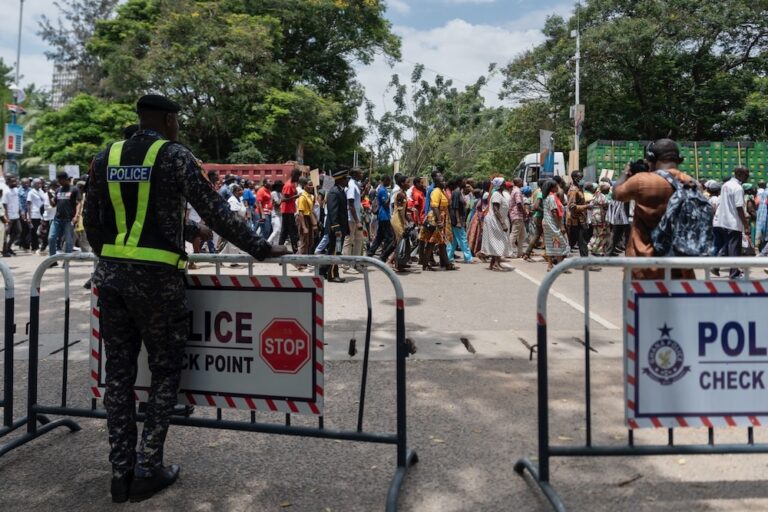(Free Expression Ghana/IFEX) – An Accra circuit court trying two journalists, Eben Quarcoo and Kofi Coomson, together with Tommy Thompson, publisher of the “Free Press”, is to rule on whether or not to allow verbatim reports by journalists of legal proceedings against the trio. No dates have been fixed for the hearing, but Judge Victor […]
(Free Expression Ghana/IFEX) – An Accra circuit court trying two
journalists, Eben Quarcoo and Kofi Coomson, together with Tommy Thompson,
publisher of the “Free Press”, is to rule on whether or not to allow
verbatim reports by journalists of legal proceedings against the trio. No
dates have been fixed for the hearing, but Judge Victor Ofoe adjourned
proceedings to 17 August 1998 after hearing submissions from parties to the
case.
**Updates IFEX alerts dated 30 and 28 July 1998, and 23 February 1996**
This follows a submission made by Deputy Attorney General Martin Amidu, who
urged the court to restrain journalists from giving verbatim reports with
the explanation that such reports give an impression of becoming the
official record of the court. He made reference to “The Ghanaian Chronicle”
and said its ‘question and answer’ mode of reporting court proceedings was
bound to give the public an impression that these reports constituted the
official record of the court. He argued further that, in a situation where
the reports differ from the official record of the court, they were liable
to be misinterpreted and thus prejudice the case.
Akoto Ampaw, counsel for the “Free Press”, reacted by saying journalists had
a duty to report all issues as much as they could and a verbatim report
ensured that they avoided falling in contempt of court. By reporting
verbatim, he said, journalists were not infringing any known condition of
the Constitution, the Courts Act or the basic fundamental principles of
common law under which the court could bar journalists from covering its
sessions.
In exceptional situations where the court could bar journalists, these
conditions must be based on public order, safety or morality, concluded
Ampaw, while counsel for the “The Ghanaian Chronicle”, Emmanuel Ohene said
that, if the position of the Attorney General were to be considered, then
journalists would have to wait for the court’s official record of
proceedings before publishing any stories.
Background Information
Coomson, editor-in-chief of “The Ghanaian Chronicle”, and Quarcoo, former
editor of the “Free Press”, were charged in 1996 under obsolete colonial
criminal libel laws for carrying articles in their respective publications
which accused the Ghana government of drug-trafficking. Last July, the
courts order the arrest and remand of Coomson and Quarcoo, claiming the two
were likely to jump bail in connection with the criminal proceedings pending
against them. Later that month, the two journalists had their bail
conditions rescinded and their passports deposited with the courts for fear
that they would jump bail before their case was heard (see IFEX alerts).


